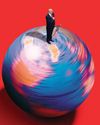As Britain stumbles through a Brexit mess, corporations are turning to Ireland—cool, confident, coherent—as the crown jewel of their European operations. Is the grass really greener in Dublin? Richard Morgan travels across the Irish Sea to discover a nation coming to terms with a new international identity and its unexpected role as economic exploiter of goings-on in London. (Rather than the other way around.)

IT WAS SUPPOSED TO BE A GOOD YEAR FOR TAOISEACH LEO VARADKAR. In January, for the first time since 2007, the Irish government— which was so savaged by the global financial crisis of 2008 that it was under the International Monetary Fund’s thumb until 2013— announced a budget surplus. Drastic survival tactics had paid off, including cutting public-sector salaries by as much as 20% and freezing all public-sector hiring and promotions. It had been uncomfortable. The collapse of the Celtic Tiger bubble—with its bankruptcies, layoffs, and foreclosures—was anything but a distant memory. But Ireland was back in the black. Imagine the indignity, then, for its top minister to step up to a lectern and tell the press four grim words: “Nobody will go hungry.” A panic over food shortages had gripped the country ahead of Varadkar’s budget announcement, sparked by the specter of a so-called “hard Brexit” by its top trade partner, the United Kingdom. (About half of Ireland’s food and live-animal imports come from the U.K.) The Irish government published a contingency action plan warning of “severe macroeconomic, trade, and sectoral impacts.” A flurry of tense news headlines followed.
This story is from the March 2019 edition of Fortune.
Start your 7-day Magzter GOLD free trial to access thousands of curated premium stories, and 9,000+ magazines and newspapers.
Already a subscriber ? Sign In
This story is from the March 2019 edition of Fortune.
Start your 7-day Magzter GOLD free trial to access thousands of curated premium stories, and 9,000+ magazines and newspapers.
Already a subscriber? Sign In

THE NEW GOLD RUSH
Gold prices have soared amid global uncertainty and a central-bank-driven buying spree. But this time, the gold mining industry looks very different.

A New Season for Giving
As the PGA TOUR kicks off its 2025 season alongside its sponsors in Hawai'i, the organization is continuing to make an impact in local communities.

WELCOME TO ELONTOWN, USA
The small town of Bastrop, Texas (pop. 12,000), has become a home base for Elon Musk's business empire. What comes next is anyone's guess.

100 MOST POWERFUL PEOPLE
Our inaugural, authoritative ranking of the leaders whose innovation and impact have elevated them to the top of the business world.

ARE CEO SABBATICALS THE ULTIMATE POWER MOVE?
WHEN VENTURE capitalist Jeremy Liew and his wife were dating, they talked about how one day they would take a year to travel the world. \"That's how we'd know we'd made it,\" Liew says.

WHAT ARE THE BEST METRICS FOR MEASURING A STARTUP'S POTENTIAL?
IN HIS 2012 ESSAY \"Startup = Growth,\" Paul Graham talks about a 5% to 7% weekly growth rate as table stakes for startup success. If you're growing 10%, he says, you're doing \"exceptionally well.\"

TECH POLYMARKET'S ELECTION ACCURACY MADE SHAYNE COPLAN A STAR-BUT AN FBI RAID POINTS TO TROUBLE AHEAD
IN NOVEMBER, Shayne Coplan had a week he'll remember for the rest of his life: He got a phone call from the highest echelons at Mar-a-Lago. He went on TV for the first time. And his New York City apartment was raided by the FBI.

WHY BIG TECH IS THE NUCLEAR INDUSTRY'S NEW BEST FRIEND
OVER THE PAST several years, Big Tech firms like Google and Microsoft have trumpeted ambitious plans to go carbon-neutral, or even carbon-negative, by 2030. But then the generative-AI boom came along and threw a giant wrench in their plans.

WHAT PALMER LUCKEY, THE MAN REVOLUTIONIZING WARFARE, IS AFRAID OF
PALMER LUCKEY, the founder of the $14 billion Al-powered weapons startup Anduril, has become the face of change in the defense industry.

GLOBAL BUSINESS BRACES FOR TRUMP 2.0
AROUND THE WORLD in 2024, voters chose change: in South Africa, France, Britain, and Japan. But nowhere does the anti-incumbent trend matter more than in the United States.